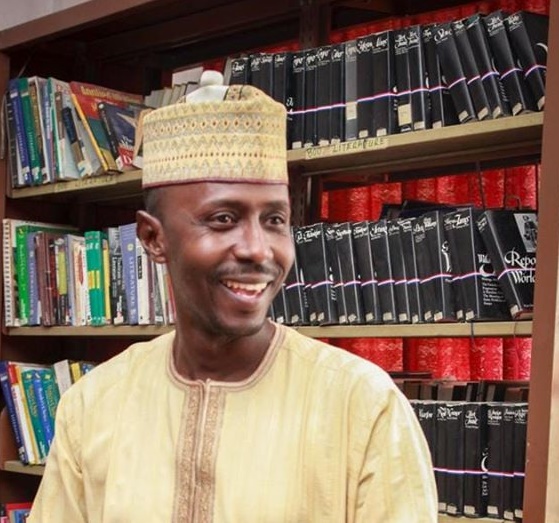Konya Shamsrumi: What is the process of writing a poem like for you? Is it a lot of hard work or easy?
Khalid Imam: It is not hard to anyone familiar with the creative process of crafting a poem not to liken it to that of pregnancy. A healthy pregnancy conceived naturally goes through several sequential processes before childbirth. The human mind is like a womb where the Muse resides to creatively grow from a zygote till it metamorphoses into an embryonic stage. And like a living embryo, a poetic inspiration develops into a fetus (an idea), and the steady process of gestation the embryonic poetic idea undergoes could lead to the birth of a poem.

So frankly, going by the obviously excruciating pains of maternity a pregnant woman endures for a period of about nine months before delivery, it is not for me conscious of this profound fact to carelessly vomit that the process of writing poetry (if you like a poem) likened to that of pregnancy is dismissively easy. Again, it is not difficult for one to fathom that a poem not properly guided through the creative metamorphosis a pregnancy equally goes through is manifestly at a high risk of being aborted. Even if not aborted, the danger is such that the poem may only live a life permanently shouldering a misfortune of being born with a lifelong deformity like a physically challenged baby.
In another sense, a poet crafting a poem works like a gardener. Ask any serious-minded gardener if sowing, watering and nurturing a seed into an awesome rose is an easy task for Tom, Dick and Harry. No beautiful garden, full of roses and edible sweet fruits, comes to full life within a whisker. Or does a baby boy wear long beard before his naming ceremony? Even though some poets may rightly argue that not all birthed poems demand a lot of stressful efforts to be born. Some poems are effortlessly penned.
Personally, l admit crafting a poem is like baking bread which demands diligent procedure, conscious effort and sound knowledge to be properly baked. Sometimes, the imaginative production of poetry is apparently a very daunting process requiring the poet to dive into a sea of creativity
Aptness, brevity, precision and harmony of the metaphors and imageries in a poem are successfully achieved in simple but not simplistic ways. If you like, you can freely state that the process of writing a poem is both difficult and easy. Imagination is like a river, and as we all know, the season plays significant role in influencing the amount of water flowing in any river. This simply is to say that the state of mind of a poet radically dictates the direction his imaginative wind blows.
Konya Shamsrumi: Please describe your sense of identity in this or any
possible world in imagery or metaphor?
Khalid Imam: The world today, more than at any other time, is being reduced with astonishing amazement into a basket of fruits. The more one observes the differences in fruits all packed in the basket, the better one appreciates the inseparable commonness of identity they share as fruits. Not as an individual protruding pineapple, perhaps boxing a bunch of bananas to a corner. Identity, to me, is simply that the sizes of tubers of yam or cassava the farmer brings to me asking for my daughter’s hands for his son are insignificant gifts. What is more significant is the bond of common humanity and mutual love. So, identity, to me, truly suggests that humans are humans regardless of their pluralities, diversities and differences in creed and culture.
Konya Shamsrumi: If any of your poems could literarily save a persons life, which poem would it be and can you describe the person whose life you think it would have saved?
Khalid Imam: Why Am I A Maid? is a poem l crafted in 2010 or thereabouts with the sole purpose of bringing to light the cruelty and dehumanizing lives of young rural lasses. They are illegally trafficked daily in numbers from our villages to unsafe cities, are subjected to the attention of a carefree world.
Child-trafficking and child-labour are criminal and unjust. Sadly, many young girls who have been reduced to maids serving in homes in cities in Nigeria are daily abused, assaulted, raped and denied tasting the honey of knowledge. Dozens of such poor girls are yearning to have a better life and future, like the children they are paid peanuts to wash panties for or serve as nannies. A good number of these unfortunate girls in these Nigerian cities are consumed by the tyranny of competitive consumerism and alien style of life, they live and suffer untold hardship.
This ugly development that is both oppressive and evil by all accounts, is unacceptable and should be challenged by all conscious minds. Therefore, the poem “Why Am I A Maid?” states the obvious, a call to action to all stakeholders to wake up from their deep slumber and come to the immediate rescue of these millions of battered maids across Nigeria, Africa and other foreign nations who are denied all liberties and freedoms by the unpretentious modernists whose definition of a child is only the one they gave birth to. This heartlessness and cruelty is what this poem, first published in JENda, an online journal of contemporary African news writings and research, was and is still fighting. The poem was also featured in many other national and international publications and social media outlets.

Konya Shamsrumi: What does Africa mean to you, as potential or reality?
Khalid Imam: Africa is a reality with staggering potentials to become the next destination for all sensitive and sensible investors across the world. Not minding the brainwashing strategies used and the negative stereotypes against Africa and Africans. The reality the world today lives with is that Africa occupies the heart of all issues, discussions, global economic plans and agenda as far as the issue of the future of the world is concerned. That Africa is today the leading consumer continent is a profound fact, but the richness of Africa in both human and natural resources and its dogged resilience is inevitably its liberating weapon, which, to my knowledge, effort is now being made to fully harness. The reality is that Africa would soon become that mighty eagle with its mighty wings covering the sky.
Africa will surely be on the global map once again. Many African patriots are working round the clock to ensure that Africans are educated in the language of their mothers, a policy which, as a teacher, I strongly believe would revamp African education sector. If we can do it in the foreign languages the colonialists forced on us, what would stop the future African child from excelling in education when the child is taught in the language of the mother?
And since development is a tripod with Africa fixing its educational priorities and marrying that with industrialization and Africanizing our democracy and economic growth policies, Africa is on the move to be one of the manufacturing giants in the world. What Africa seems to say now is “We are not interested in exporting raw materials; we are keen in engaging in export of finished products”.
Soon, Africa will stop exporting cocoa and instead export chocolates to Europe, America and Asia. This is the new thinking of new African businesses and drivers of development. The sleeping elephant has woken up. Africa is on the rise again.
Konya Shamsrumi: Could you share with us one poem you’ve been most impressed or fascinated by? Tell us why and share favorite lines from it.
Khalid Imam: Without any doubt, David Diop’s The Vultures—a poem which l had the fortune to study during my NCE program some twenty years ago. It still stands out as my best or most inspiring poem. It inspired me, for the first time, to recognize and accept myself as an African who is proud of his roots and who is also ready to fight all the oppressions and injustices meted out to Africa not only ‘by the Vultures (Europeans)’ but including their native African collaborators.
Below are some of my favourite lines, these have stuck in my mind till today:
The vultures built in the shadow of their claws
The bloody monument of the tutelary era
In that time
Laughter gasped its last in the metallic hell of roads
And the monotonous rhythm of Paternosters
Covered the groans on plantations run for profit
O sour memory of extorted kisses
Promises mutilated by machine-gun blasts
Strange men who were not men
You knew all the books you did not know love
Or the hands that fertilize the womb of the earth
The roots of our hands deep as revolt
Despite your hymns of pride among boneyards
Villages laid waste and Africa dismembered
Hope lived in us like a citadel
And from the mines of Swaziland to the heavy sweat of Europe’s factories
Spring will put on flesh under our steps of light.
In these memorable lines, the poet tells the gruesome tale of the thievery. Of “Strange men” who sadly “knew all the books,” but “did not know love”. These “vultures” didn’t only rob Africa of her innocence, riches and virginity, they ensured that all “promises (were) mutilated by machine-gun blasts” while they forcefully took African lands and converted these into “plantations run on profits.”
The beauty of this poem lies in how it raises the hope of all informed and patriotic Africans whose ancestors’ selfless labour was commendable. Sadly, till date, it seems Africa’s “laughter gasped its last in the metallic hell of roads,” as its major cities, towns and “villages laid in waste.” Poor Africa, as it still stands, its nations are “dismembered”. As Africans, we believe there is still hope as we continue singing “hymns of pride” and “hopes live in us like a citadel”. For sure, this poem has stuck in my mind as it continues to serve as a clarion call to all Africans to unite and save mother Africa from the vultures.
Khalid Imam, a Nigerian poet, is the initiator and coordinator of the All Poets Network, a platform innovatively promoting multiple critical reviews for a poem shared each week by different readers. Khalid Imam was among the ten finest Nigerian writers selected by the Wole Soyinka Foundation in 2018 to participate at the SAIL Program in Lebanon. He is the immediate past Vice Chairman of the Association of Nigerian Authors, Kano State Branch. Imam is a postmodernist African panegyric poet, teacher, translator, editor, literary columnist and a multiple award-winning bilingual playwright and poet. He has published in UK, US, India, Germany and Poland among others. Khalid Imam has authored over a dozen books, including, A Song of San Kano, Sodangi, Barde Barbushe, Kundin Hirarrakin Bukar Usman, Falsafar Bukar Usman, The Amigo Sisters and Justice, Fairness & the Quest for Egalitarian Societies, among others.
- Poets Talk: 5 Questions with Kayeon Onyeka - February 25, 2025
- Poets Talk: 5 Questions with Jakky Bankong-Obi - December 3, 2024
- Poets Talk: 5 Questions with Odu Ode - November 26, 2024












Leave a Reply